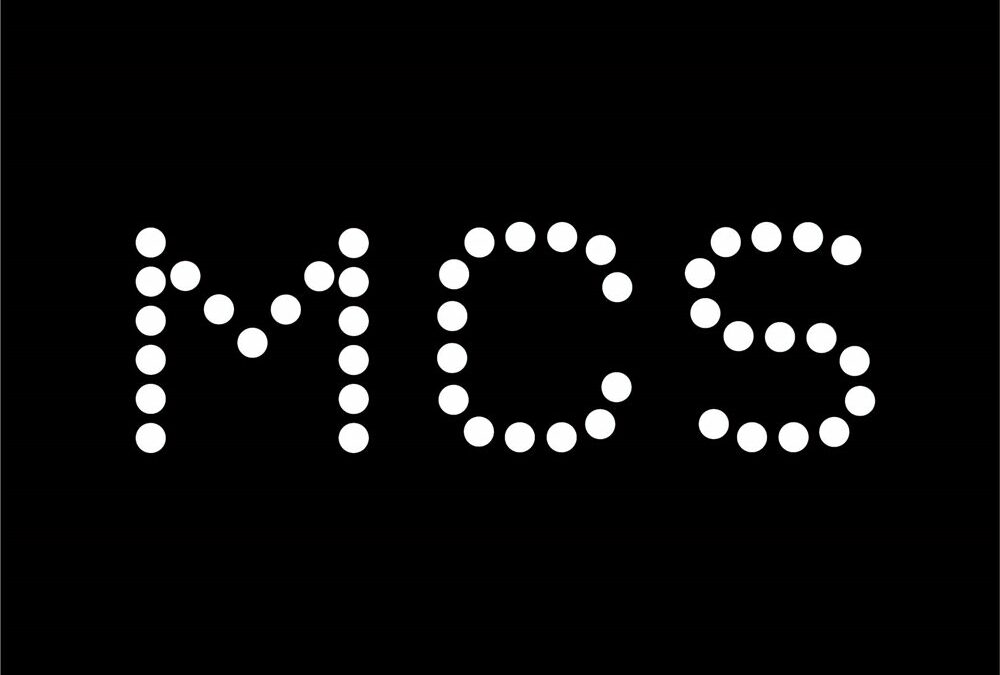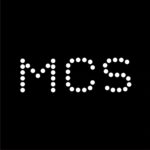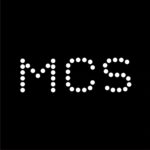Post Updated: 8 April 2024
What does MCS Stand for?
MCS stands for the Microgeneration Certification Scheme, an initiative that was introduced in 2007 to support the fast-growing microgeneration industry in the UK. Microgeneration refers to the small-scale production of heat or electric power from renewable sources, such as solar panels, wind turbines, heat pumps, biomass boilers, and battery storage systems.
What is MCS certification and why is it important?
MCS certification is a mark of high quality that demonstrates that a product or an installer meets the industry-expected level of high quality, performance, and safety. MCS certification also enables consumers to access financial incentives from the government, such as the Smart Export Guarantee (SEG) scheme for electricity generation and the Renewable Heat Incentive (RHI) for heat generation.
MCS certification is important for both consumers and installers/manufacturers of microgeneration technologies. For consumers, MCS certification gives them confidence in the quality and reliability of their chosen product and installer, as well as access to financial benefits and consumer protection. For installers/manufacturers, MCS certification showcases their competence and compliance with industry standards, as well as helps them to grow their business and reputation in the renewable energy market.
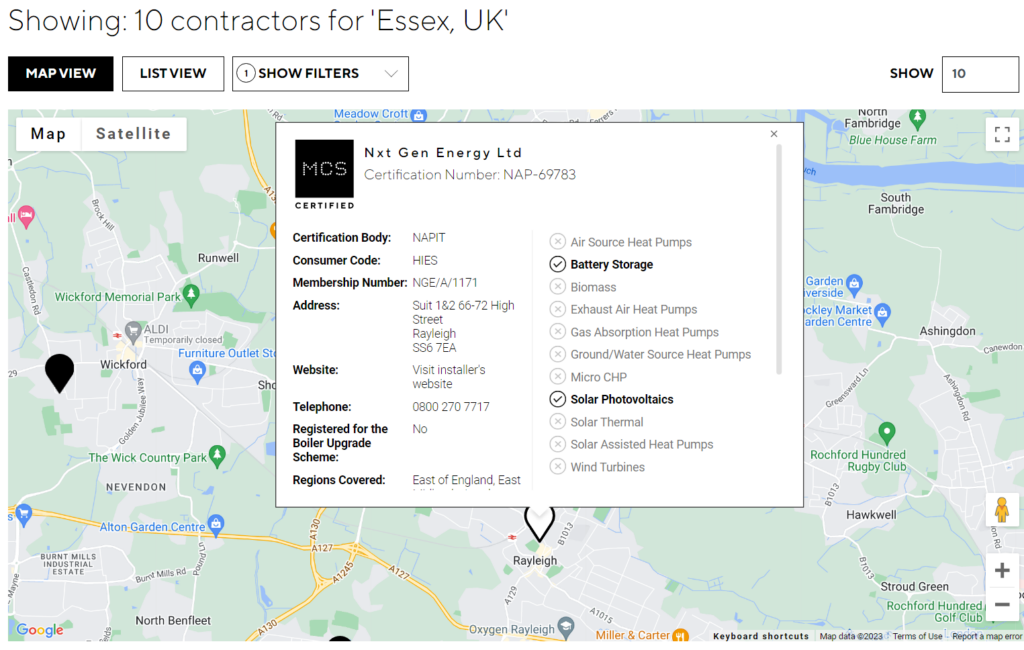
How to become MCS certified?
There are two types of MCS certification: product certification and installer certification. Product certification applies to manufacturers of microgeneration technologies, while installer certification applies to contractors who install these technologies.
Product Certification
To get product certification, manufacturers need to contact one of the approved MCS Certification Bodies and submit their product(s) for assessment. The Certification Body will check that the product(s) meet the relevant MCS Product Standard, which specifies the technical requirements and performance criteria for each type of technology. The Certification Body will also verify that the production environment and processes meet MCS requirements. Additionally, manufacturers need to provide product testing results from an accredited laboratory for assessment.
Installer Certification
To get installer certification, installers need to contact one of the approved MCS Certification Bodies and demonstrate their competency and quality in installing microgeneration technologies. The Certification Body will check that the installer meets the relevant MCS Installer Standard, which specifies the installation requirements and best practices for each type of technology. The Certification Body will also verify that the installer has the necessary qualifications, skills, experience, insurance, and customer care policies. Additionally, installers need to provide evidence of completed installations for assessment.
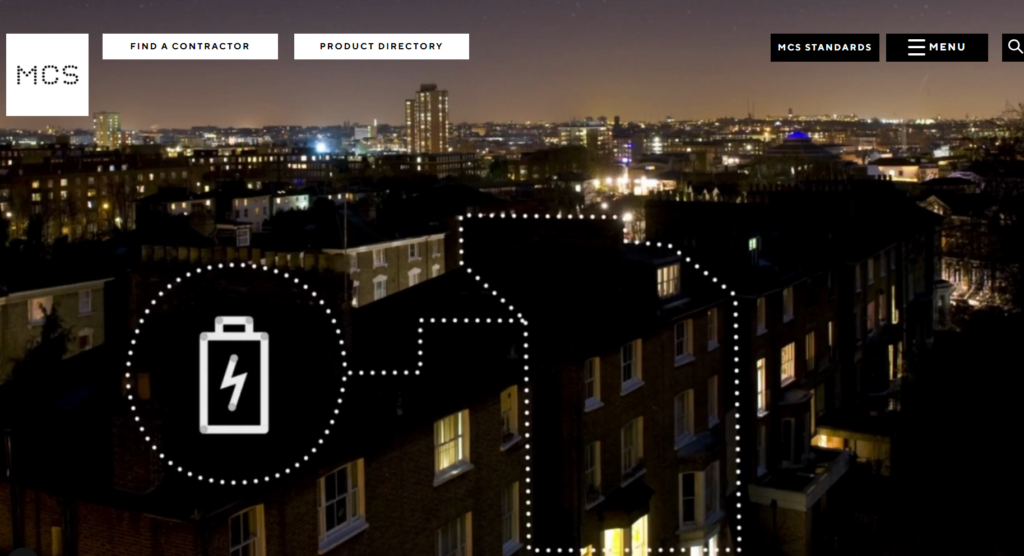
What are the benefits of MCS certification?
MCS certification has many benefits for both consumers and installers/manufacturers of microgeneration technologies. Some of these benefits are:
1. Quality assurance
MCS certification ensures that products and installers meet high standards of quality, performance, and safety, which reduces the risk of faulty or substandard installations.
2. Financial incentives
MCS certification enables consumers to access government schemes that pay them for generating renewable energy, such as the Smart Export Guarantee (SEG) scheme for electricity generation and the Renewable Heat Incentive (RHI) for heat generation. These schemes can help consumers save money on their energy bills and earn a return on their investment.
3. Consumer protection
MCS certification provides consumers with access to independent dispute resolution services in case of any issues or complaints with their product or installer. Consumers can also benefit from warranty schemes that cover their products for up to 10 years.
4. Market recognition
MCS certification showcases installers/manufacturers as competent and compliant with industry standards, which can help them attract more customers and increase their reputation in the renewable energy market.
5. Environmental impact
MCS certification promotes the use of low-carbon energy technologies that can help reduce greenhouse gas emissions and combat climate change.
How much does it cost to become MCS Accredited?
The cost of becoming MCS accredited depends on the number of technologies you want to install and the certification body you choose. The initial application for one technology would cost £700 plus VAT, including initial application fee £130, annual renewal £515 and MCS Licence £55. Certification must be renewed every year at a cost of £570 plus VAT. You can find a list of certification bodies that offer MCS certification here. You can also find more information about the process and benefits of becoming MCS certified on the official website mcscertified.com or on the blog post A Guide to Becoming MCS Certified.
What does an MCS Certificate look like?
An MCS Certificate is a document that shows that your renewable energy system has been installed by an MCS certified installer using an MCS certified product. It also contains information such as the system details, the commissioning date, the certificate number and the installer details. An MCS Certificate is required if you want to claim any government incentives for your system, such as the Smart Export Guarantee (SEG) scheme or the Renewable Heat Incentive (RHI) scheme.
MCS Certificate Example
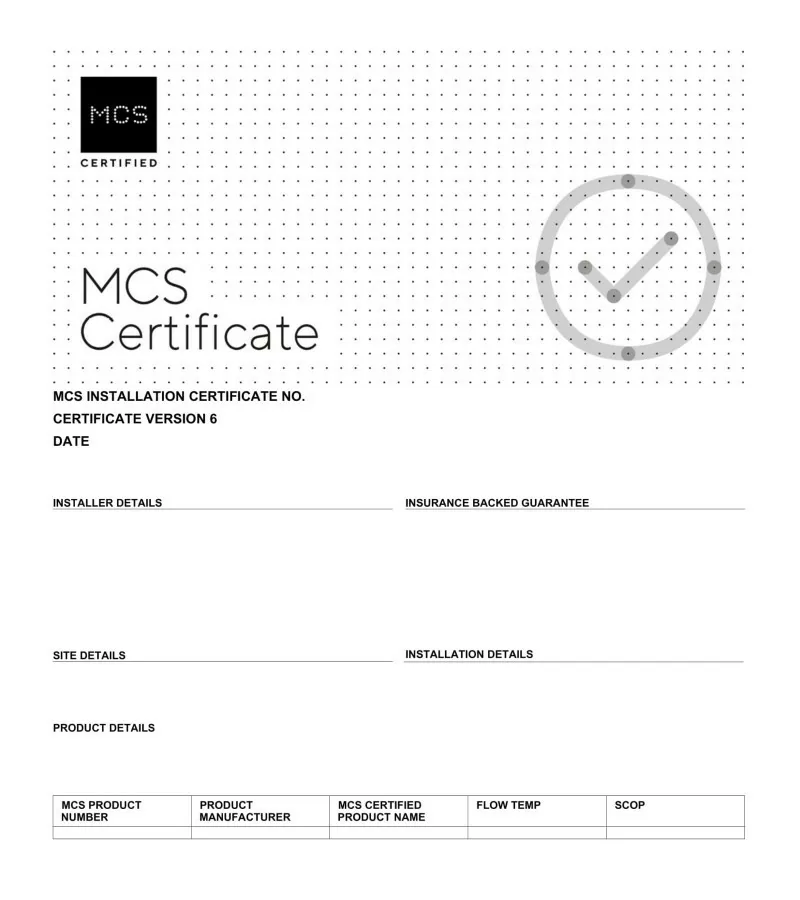
You can find more information about MCS Certificates and how to obtain or amend them on the official website mcscertified.com or check the MCS FAQ page here.
How do I get a copy of my MCS Certificate?
If you have never received your MCS Certificate, or if you need a copy of it, you should contact your original MCS certified installer in the first instance to request this. If your installer is no longer MCS certified or no longer trading, you can contact the MCS helpdesk to obtain a copy of your certificate. To do this, you will need to provide proof of ownership and pay an admin fee of £30 + VAT. You can find more details about the process and the evidence required on the official website mcscertified.com or on the online enquiry form here.
MCS Helpdesk
The MCS helpdesk is a service that provides support and guidance for consumers, installers and manufacturers who are interested in or involved with the Microgeneration Certification Scheme (MCS). The MCS helpdesk can answer questions about the scheme, the certification process, the benefits of MCS certification, and the eligibility criteria for government incentives such as the Smart Export Guarantee (SEG) scheme and the Renewable Heat Incentive (RHI) scheme. The MCS helpdesk can also help with queries about MCS certificates, which are proof that an installation has been done by an MCS certified installer using an MCS certified product. The MCS helpdesk can provide copies or amendments of certificates for a fee, or check whether a certificate exists for a given installation. The MCS helpdesk operates Monday – Friday, 9.00am – 4.30pm. The Helpdesk is closed on bank holidays. Customers can contact the MCS helpdesk by phone, email or online enquiry form. The contact details are as follows:
- Phone: 0333 103 8130
- Email: hello@mcscertified.com
- Online enquiry form: here
For more information about the MCS helpdesk and the MCS scheme, customers can visit the official website mcscertified.com or check the MCS FAQ page here.
Conclusion
MCS certification is a mark of quality that demonstrates that a product or an installer meets the industry-expected level of quality, performance, and safety in microgeneration. The MCS scheme also enables consumers to access financial incentives from the government, as well as consumer protection services. For installers/manufacturers, MCS certification showcases their competence and compliance with industry standards, as well as helps them grow their business and reputation in the renewable energy market. MCS certification is an important scheme that supports the development and adoption of small-scale renewable energy generation in the UK.
NXTGEN Energy are MCS Certified Solar PV and Battery Storage Installers
Remember not all Solar Panel Installers are MCS Certified! NXTGEN Energy Ltd. are proud to be both MCS Certified Solar PV (Panel) Installers and also MCS Certified Battery Storage Installers. We are 1 of only 10 Solar Installers in Essex who are certified on both Solar PV and Battery Storage. This means we can install your complete Solar PV System to the high quality, performance, and safety as required by MCS Certification in the UK. Have you checked your installer on mcscertified.com?
If you are thinking of installing solar panels, solar battery storage or both, contact us here at NXTGEN Energy for a free no-obligation quote and solar PV system design on 01268 928 690, email: info@nxtgen.ltd or by clicking on the ‘Enquire Now’ button below. Think Solar? Think NXTGEN Energy!
NXTGEN Energy – Your Trusted Solar Energy Solutions Partner 💚
Frequently Asked Questions about MCS Certification
The Microgeneration Certification Scheme (MCS) is an independent certification scheme that certifies microgeneration (renewable energy) products and installers. These consist of small scale renewable electricity and heat technologies such as solar PV, biomass, wind, heat pumps and battery storage.
MCS Certification is important for several reasons:
1. It gives consumers confidence that they are getting a high-quality product and service that meets their needs and expectations.
2. It enables consumers to access financial incentives such as the Smart Export Guarantee (SEG), which pays them for exporting surplus electricity to the National Grid.
3. It helps the industry grow by defining what constitutes good practice in the sale, design, and installation of microgeneration systems.
4. It supports innovation and development by providing feedback and data on the performance and impact of microgeneration systems.
If you are a contractor or manufacturer who wants to showcase quality renewable installations, you can apply for MCS certification through an accredited certification body. You will need to demonstrate your compliance with the MCS standards, codes of practice, and consumer protection measures. You will also need to pay an annual fee and undergo regular audits.
If you are a consumer who wants to install a microgeneration system in your home or business, you will need to choose an MCS certified installer who can supply, design, and install an MCS certified product. You will also need to register your installation on the MCS Installation Database (MID) and obtain an MCS certificate.
You can find more information about MCS on their website at https://mcscertified.com/. You can also contact their helpdesk team by phone at 0333 103 8130 or by email at hello@mcscertified.com.
Latest MCS Certified Posts
- Who are NXTGEN Energy Ltd?NXTGEN Energy Ltd are a solar energy company based in Rayleigh, Essex, UK. They specialize in the installation of solar panels, battery storage systems, and electric vehicle chargers for homes and businesses across the UK. They are MCS certified, which means they meet the Microgeneration Certification Scheme’s standards for quality and safety. This makes them… Read more: Who are NXTGEN Energy Ltd?
- Solar PV System Installation ChecklistConsidering buying solar panels? If you are thinking of installing a solar PV system on your roof, you might be wondering what steps you need to take to ensure a successful and safe solar PV system installation. A solar PV system can provide you with clean and renewable energy, reduce your electricity bills, and earn… Read more: Solar PV System Installation Checklist
- MCS CertificationPost Updated: 8 April 2024 What does MCS Stand for? MCS stands for the Microgeneration Certification Scheme, an initiative that was introduced in 2007 to support the fast-growing microgeneration industry in the UK. Microgeneration refers to the small-scale production of heat or electric power from renewable sources, such as solar panels, wind turbines, heat pumps,… Read more: MCS Certification
- NXTGEN Energy Ltd is now MCS Certified for Battery Storage InstallationsIf you are looking for a reliable and MCS Certified installer of solar battery storage systems, you might want to consider NXTGEN Energy Ltd. We are one of only nine solar installers in Essex that has achieved the MCS Certification for battery storage, which means we meet the highest standards of quality and safety in… Read more: NXTGEN Energy Ltd is now MCS Certified for Battery Storage Installations
- NXTGEN Energy is a MCS Certified InstallerNXTGEN Energy Ltd are proud to be MCS Certified Installers. But what does that mean for you? MCS certification is a mark of true high quality and workmanship. In becoming an MCS certified installer, we are showing our continuing commitment to protecting our customers, and guaranteeing a high quality service under oath of the Consumer… Read more: NXTGEN Energy is a MCS Certified Installer

